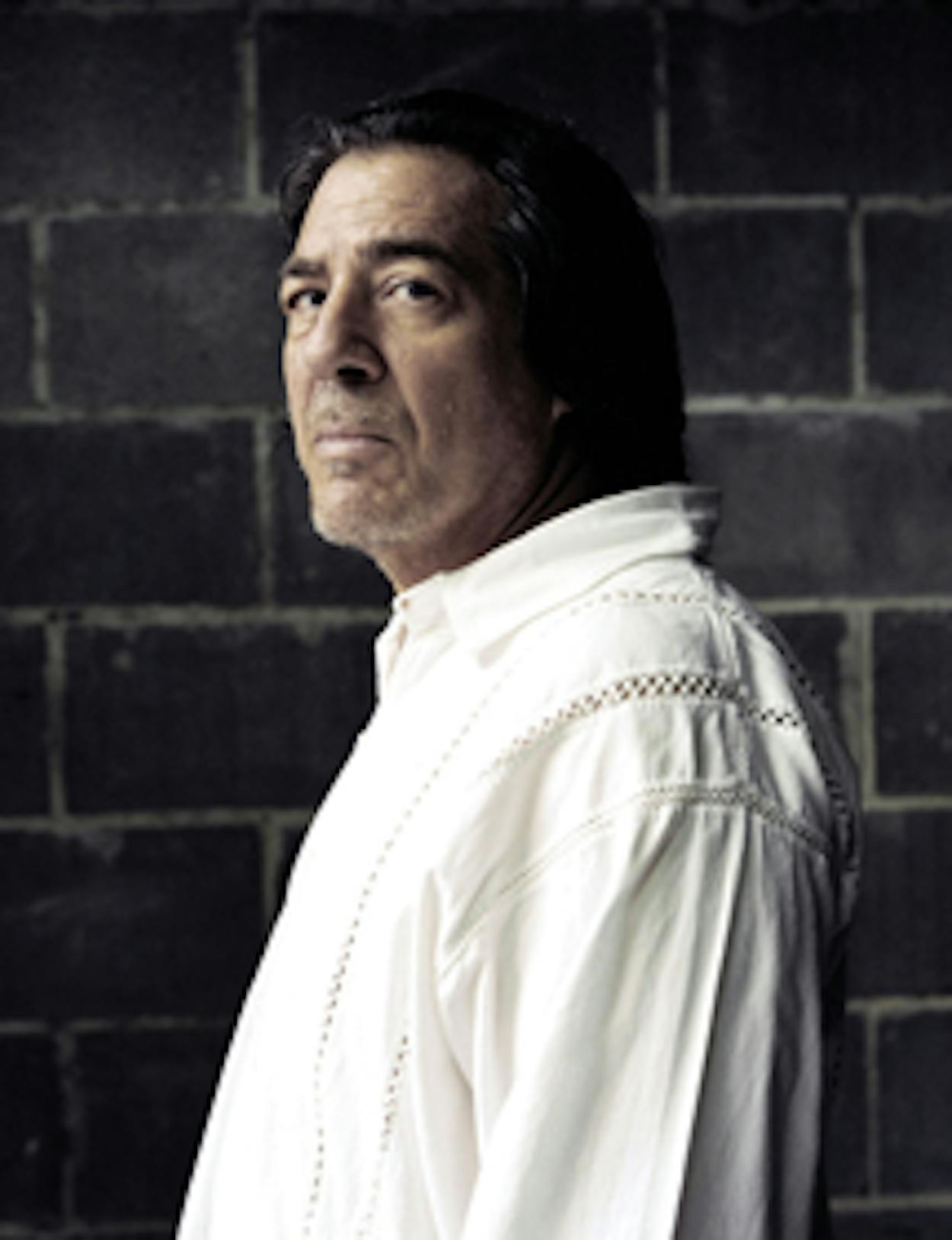Until recently, Dagoberto Gilb, the Austin-based short story writer and novelist, did not give much thought to his own physical limitations. A self-described “brawny, strong person,” he worked construction jobs before receiving a Dobie Paisano Fellowship in 1987 and publishing his critically-acclaimed prize-winning debut collection, The Magic of Blood (1993). He sustained few injuries over the years and, well into middle age, felt as strong as he did in his twenties.
That changed in May 2009, when Gilb had a stroke that rendered the right side of his body virtually useless. The author, who was born in 1950, spent many months in painful recovery, slowly regaining movement. He acknowledges that he will never be the strapping specimen he once was.
“The way I describe it is that the right side of my body is on Jupiter,” he said in a recent interview. “The gravitational pull is different.”
For Gilb, a writer who has a hard time moving on to the next sentence if the previous one is not perfect, the stroke also threw his literary future into question. He tried to return to work on a long-gestating novel, typing with his left hand, but soon set it aside.
“Every five keystrokes would have a typo,” he said. “I just couldn’t tolerate that.”
As he has throughout his career, in volumes like Woodcuts of Women (2001) and The Flowers (2008), Gilb drew on personal experience for new inspiration. He began a short story titled “please, thank you,” a kind of poem in prose, about a stroke victim named Mr. Sanchez recovering in a hospital. Gilb’s struggles with his own keyboard are deftly woven into the text, which contains no capital letters or apostrophes. In the voice of Mr. Sanchez, he writes, “even by staring right down at the keys, i type y for t often, for instance, or o for p.”
“please, thank you,” originally published in Harper’s Magazine in 2010, became the first story in Gilb’s new collection, Before the End, After the Beginning, which came out earlier this month. Five other works in the ten-story volume were also composed after his stroke, including “Uncle Rock,” which the New Yorker published last year. (He also switched jobs in fall 2009, from Texas State University, in San Marcos, where he taught writing for many years, to the newly created position of artist-in-residence and executive director of the Center for Mexican American Literature and Culture at the University of Houston-Victoria.)
The book connects to Gilb’s earlier efforts, and his preoccupation with young, working-class Mexican-American men prone to getting themselves in trouble. But a number of the pieces, including the final story, “Hacia Teotitlán,” about a man who travels to Mexico to die, are movingly born out of the author’s anxiety about his mortality.
“I actually do think it was something I was aware of,” he said. But after the stroke, he added, the “finiteness” of life “becomes more and more starkly real.”
Gilb’s collaborators say they do not necessarily see his new work as a major departure. ”Sometimes the manuscripts are a little messier,” Cressida Leyshon, the deputy fiction editor at the New Yorker, said of Gilb’s struggles with typing. “But the stories themselves remain as subtle and complex as ever.”
As much as Gilb says that the stroke has mellowed him, he also remains true to his longstanding reputation as a boisterous, sometimes irascible figure. For one thing, despite his awards and publication history, he still feels very much like an outsider, looked upon with a degree of skepticism by the East Coast establishment. He was especially vexed that the story “Hacia Teotitlán,” which he regards as one of the best he has ever written, was rejected by all of the magazines to which he submitted it.
“I’m put in some exotic box,” said Gilb, who was born in Los Angeles, to a Mexican mother and Anglo father. “I’m like Cheech Marin. I’m the colorful sidekick. I feel that a lot.”
The author Oscar Casares (Brownsville, Amigoland), one of Gilb’s former students, who has written about the Mexican-American experience in his own fiction, empathizes with Gilb’s frustrations, though he resists the suggestion that the subject matter and the characters in Gilb’s work are regarded as less important to the literary world.
“I don’t think it’s a question of his characters being seen that way,” Casares said. “But there is a way that these characters and the men they represent are less visible in real life—no different than my characters that happen to live on the U.S.-Mexico border.”
Leyshon added that she thinks Gilb is indeed widely respected among tastemakers, and not merely regarded as a “regional” or “Chicano” writer. Viewing himself as an outsider, she speculated, “may allow him to inhabit characters who are struggling to understand where they fit in.”
Whether Gilb’s frustrations with the literary establishment are justified or exaggerated, though, one thing is certain: He has made it through his medical crisis with his spirit intact. He is presently at work on a new novel, different from the one he had to abandon, and he continues to battle to regain strength on his right side.
“I had to come to grips with my vulnerabilities,” he said, wryly adding, “Now I’m not convinced that an eight-year-old couldn’t take me out.”
Read “Cheap,” a short story from Gilb’s newest collection, Before the End, After the Beginning.







